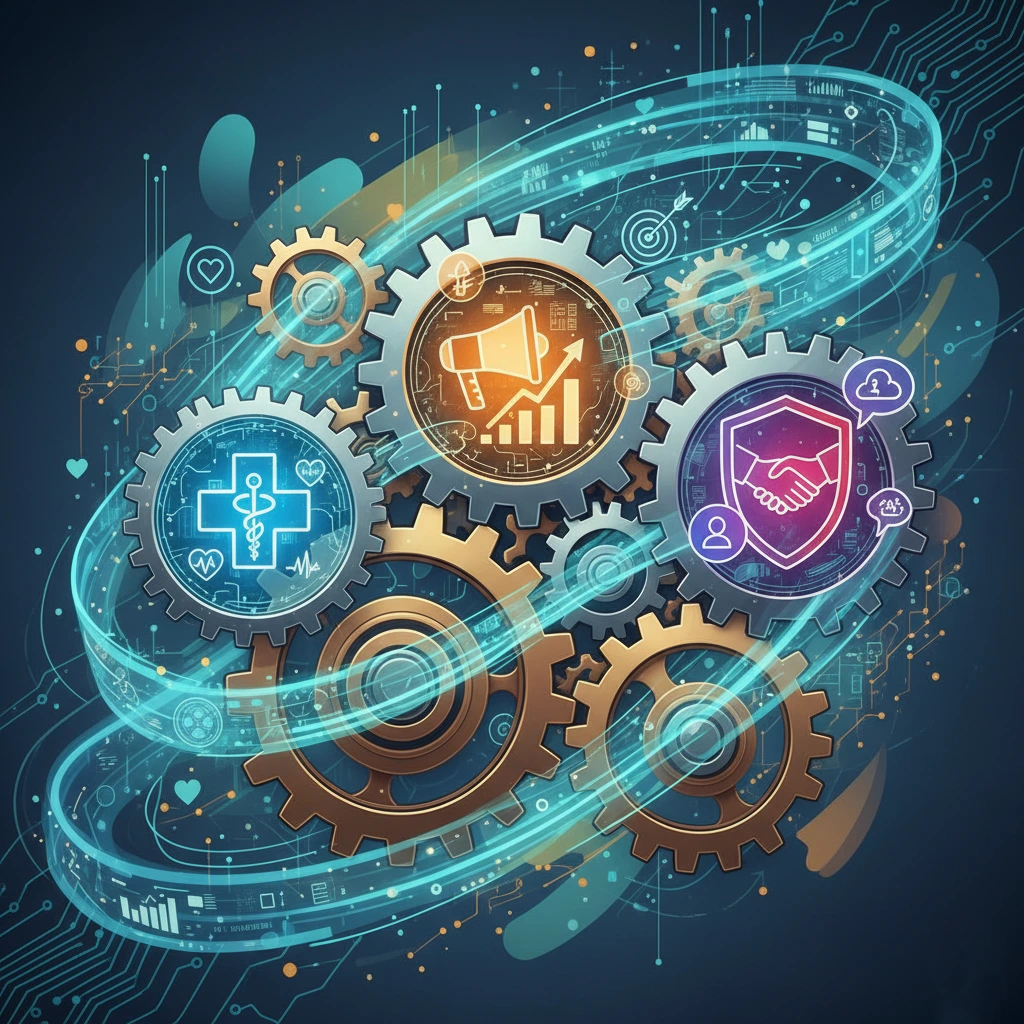 12 AUGUST 2025
12 AUGUST 2025
How AI and Automation Are Making Businesses Unstoppable
Every industry seems to be buzzing about AI and automation lately. It's not just hype anymore - these technologies are actually changing how businesses work day-to-day.
Healthcare facilities are running better, marketing departments are reaching customers more effectively, and sales teams finally have CRM systems that don't make them want to pull their hair out. The biggest changes are happening in three main areas.
Healthcare Gets a Much-Needed Upgrade
Most people think AI in healthcare means fancy diagnostic tools or surgical robots. That's not where the real action is happening right now.
The biggest difference comes from tackling something way less exciting but incredibly important: all that administrative work that bogs down healthcare workers. AI and automation in healthcare is starting to handle the endless paperwork and scheduling headaches.
Think about appointment scheduling alone. Instead of staff members juggling phone calls and trying to predict no-shows, AI systems can manage the entire process. They handle bookings, send reminders, and even forecast which patients might cancel.
Doctors and nurses are getting back time they used to spend on paperwork. That means more time actually helping patients, which is what everyone got into healthcare to do in the first place.
Marketing Finally Makes Sense
Creating personalized marketing campaigns used to be a logistical nightmare. How do you send relevant messages to thousands of different customers without hiring an army of people?
AI and marketing automation solved this problem in a pretty straightforward way. These systems can crunch through customer data much faster than humans ever could.
The technology looks at what people buy, how they browse websites, which emails they open, and tons of other behavior patterns. Then it automatically creates targeted messages that actually relate to what each person cares about.
Instead of sending generic "Dear Valued Customer" emails, businesses can now send communications that feel like they were written specifically for each recipient. The automation handles the heavy lifting while keeping the personal touch.
CRM Systems Stop Being Terrible
Anyone who's worked with traditional CRM systems knows the frustration. Hours spent updating contact info, deleting duplicates, and trying to make sense of messy data entries.
Artificial intelligence is enhancing CRM capabilities by taking over these tedious tasks. AI solutions for automated CRM data cleansing and enrichment work in the background, constantly updating and organizing information.
Sales teams don't have to worry about whether the phone number in the system is current or if there are three different entries for the same company. The AI handles data maintenance automatically.
Clean data means better insights too. When information is organized properly, patterns emerge that help identify the best sales opportunities and customer trends.
What Comes Next
AI and the future of automation isn't just about speed anymore. It's about smart systems that get better over time. These technologies learn from each interaction and make more informed decisions as they go.
Companies that figure out how to use these tools effectively will have a clear advantage. Not because the technology itself is magic, but because it frees up human workers to focus on creative problem-solving and relationship building.
The shift is already underway. Businesses that adapt quickly will find themselves ahead of competitors still stuck doing everything manually.
Contact Kiksy today to explore integrated AI solutions that could transform how your business operates.
Frequently Asked Questions
How is artificial intelligence transforming the healthcare industry?
The biggest changes aren't happening in high-tech medical procedures. AI is transforming healthcare by handling administrative tasks that eat up huge amounts of time. When systems manage scheduling, documentation, and follow-up communications automatically, healthcare workers can focus entirely on patient care instead of paperwork.
What is AI automation in healthcare?
Healthcare AI automation means using smart systems for routine tasks that don't need medical training. This includes appointment scheduling, medication reminders, basic documentation, and insurance processing. The goal is simple: let technology handle the administrative stuff so medical professionals can concentrate on treating patients.
How does AI improve efficiency in healthcare?
AI gives healthcare workers their time back. When systems handle scheduling, documentation, and routine communications, doctors and nurses get extra hours to spend with patients. This creates a positive cycle - they can see more people while giving better individual attention. Wait times get shorter and patient satisfaction improves.
How is artificial intelligence AI enhancing CRM capabilities?
AI turns basic customer databases into self-managing systems. Instead of just storing contact information, these enhanced CRMs automatically clean data, remove duplicates, and fill in missing details. They also analyze customer patterns to highlight the best sales opportunities and predict which leads are most likely to convert.
What is one way that automation in CRM systems improves efficiency and productivity?
Automated data cleaning is probably the biggest time-saver. Sales teams used to spend hours fixing outdated contact information and eliminating duplicate entries. AI handles this maintenance work continuously, so sales reps always have accurate, up-to-date information when they need it. They can spend their time building relationships and closing deals instead of cleaning up data.
Kavita Jha
Chief Executive Officer
Kavita has been adept at execution across start-ups since 2004. At KiKsAR Technologies, focusing on creating real life like shopping experiences for apparel and wearable accessories using AI, AR and 3D modeling.
